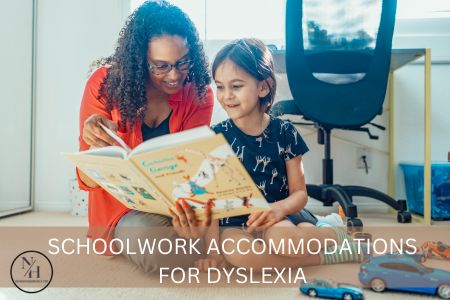One major challenge that many neurodivergent children face is in the area of school work. This is true whether the child is in mainstream school, special education class, or homeschool.
The main premise for neurodivergent children is this: we work on remediation and accommodation. Remediation involves occupational therapy and intentional training at developing the skills they need. But not everything may be “fixed” by remediation, and that’s where accommodation is important.
(Disclaimer: We use the term “fixed” tongue in cheek, in now way meaning that we intend to “fix” our neurodivergent children. We mean that remediation may work at building certain skills within the child’s capability, but which may not be achieved without the added intentionality.)
However, because not everyone is aware of every child’s specific needs and preferences, it may be more difficult to expect accommodations in larger group settings. Therefore it’s important for parents to understand how the child’s brain is wired to work, so that they can advocate for his or her best interest in the school setting.
In this series, we hope to share a few—not an exhaustive list!—ways that different neurotypes may manifest in the area of learning, with some suggested ways to give accommodation, starting with dyslexia.
Dyslexia Symptoms and Accommodation
Dyslexia is best known for a child’s difficulty to learn to read. But it includes other symptoms that also make learning a challenge, such as a poor short-term memory, a struggle understanding chronology, and difficulty remembering names for objects and people.
Throughout this website, we discuss dyslexia symptoms not just in terms of learning, but also how dyslexia affects daily life.
In this post, check out some of these symptoms and recommended accommodation specifically relating to schoolwork:
Symptom #1: Difficulty reading at grade level
Because dyslexia usually results in the child struggling to read, even when he or she is finally able to read, the added effort may mean additional struggle to understand longer texts.
Accommodation: Allow the use of audiobooks and/or speech-to-text technology
Symptom #2: Challenge with short-term memory
Dyslexics usually find it difficult to memorize lists of words. This means that they will likely have trouble memorizing facts, including math facts.
Accommodation: May use other modes of testing understanding, such as narration and storytelling, instead of requiring memorized lists. For math, consider using manipulatives, visual representations, and multi-sensory lessons.
Symptom #3: Difficulty with understanding chronology
Dyslexia affects a person’s ability to understand chronology, and therefore makes it difficult to follow a series of instructions. In school, this becomes a challenge when students are expected to follow a list of directions.
Accommodation: Use visual representations of instructions or break down tasks into more manageable chunks
Symptom #4: Struggle with naming words
Students with dyslexia tend to struggle with remembering names of persons, objects, and places correctly, making it confusing when they try to give answers that require identifying specific names.
Accommodation: It may help to write some of the names on a board or index cards that the child can refer to during lessons.
Symptom #5: Difficulty formulating sentences to describe a scene
When trying to describe a scene, a dyslexic may tend to begin at the end and meander and even lose his way! This results in an overall struggle with formulating sentences with ease.
Accommodation: Allowing drawings and comic illustrations may help him describe a scene better.
Symptom #6: Poor use of words
Poor syntax is a common symptom for dyslexia, where the child ends up using the wrong word to convey his meaning. This might come about from poor understanding of the word when read in context.
Accommodation: The child may need to encounter a word more frequently than normal in order to be able to use it correctly
Symptom #7: Tendency to talk in long, vague descriptions
A dyslexic person tends to talk or write in long-winded ways, resulting in vague descriptions that can be confusing for the reader.
Accommodation: It may help to let the child write down headings before speaking or writing so you can point him back to his own outline.
Symptom #8: Some have difficulty drawing
If your dyslexic child struggles with drawing, such as in the case of co-occurring dysgraphia, he may resist drawing activities and result in battles in the school room.
Accommodation: Parent/teacher needs to get to know the individual child and use drawing activities with discretion.
Symptom #9: Others can be excellent in drawing
On the other hand, other dyslexic persons may excel in drawing, and because of this, end up taking too much time working on drawing activities.
Accommodation: It may help to put drawing activities at the end of the class hour or the school day so the child can take his time
Symptom #10: Struggle with spelling and grammar
Because dyslexia results in struggle with short-term memory, spelling and grammar may be areas of difficulty. As a result, their written work may be difficult to understand due to poor spelling and grammatical mistakes.
Accommodation: Parent/teacher to work on spelling and grammar at a separate time, and not correct every single spelling and grammatical error in the written composition; possible allowing the use of a computer with spelling check and/or speech-to-text technology
Schoolwork Accommodations for Dyslexia
We hope this post has helped you think up creative ways to provide accommodations of your dyslexic child’s schoolwork. We’re also happy to share this information in a colorful infographic available only on our Shop Page as a PDF poster as a FREE download just for you!


